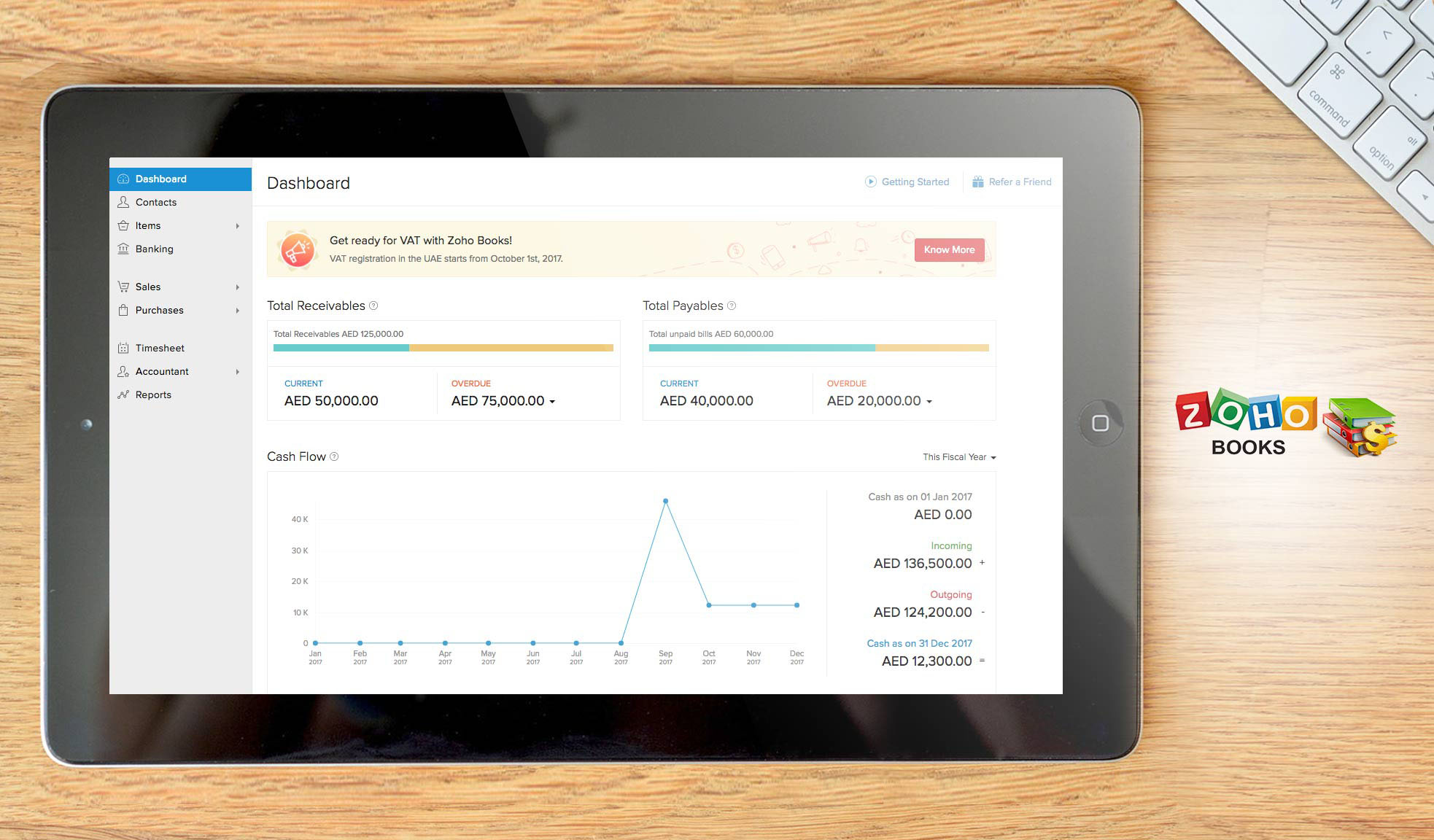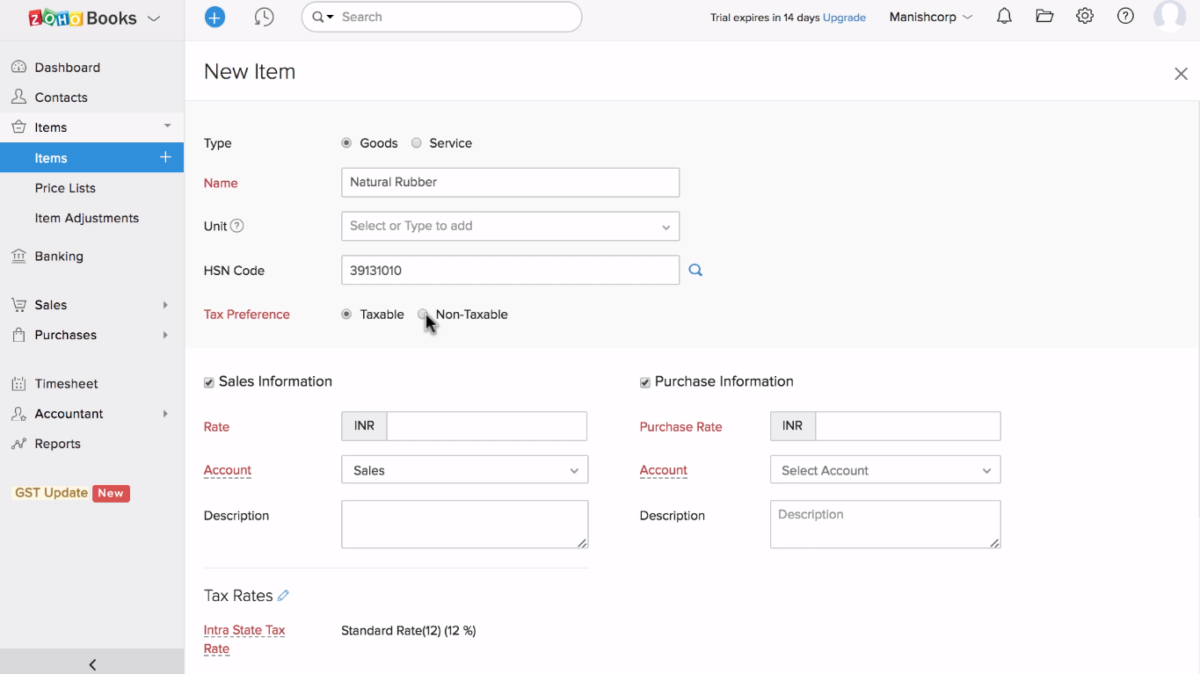If you’ve been searching around for small business accounting software, you’ll probably come across Zoho Books not a few times. But no matter the buzz you hear about Zoho, can its accounting app help you cross your t’s and dot your i’s? To answer that, let’s take a look at the pros and cons of Zoho Books.
Many think Zoho Books is a steal because of the price points, one of the lowest in the category. It can surely help you keep accurate records and comply with regulations while saving you time and money. But let’s go beyond pricing and basic features and look at the pros and cons of Zoho Books.
In this article, we will discuss where and when it can be helpful to freelancers, small and medium businesses (SMBs) and even large enterprises. By the time you’re done reading the article, you’ll have a better grasp of Zoho Books, if indeed, it’s the best accounting platform for you.

Pros and Cons of Zoho Books Table of Contents
It is not just individual professionals and SMBs who are susceptible to accounting errors. In fact, big popular businesses can also make embarrassing accounting blunders. Bank of America, Rolls Royce, and even the State of California are three world-famous entities that have bungled their books.
The causes of such organizational calamities are many. Bad judgment is one but also a spreadsheet boo-boo is another.
Once, the British intelligence agency MI5 in 2010 suffered a spreadsheet formatting error. This error caused them to tap into more than a thousand incorrect phone numbers.
Another spreadsheet mishap is when London Olympic staffers entered 20,000 in a cell instead of 10,000. This led the Committee to sell extra 10,000 tickets for imaginary seats! These errors when you are of that size are terribly costly. The losses can be arguably imagined. The embarrassment not so easy.
This is exactly why a dedicated accounting platform is preferred over good old spreadsheets. In fact, these accounting statistics tell us that 90% of accountants feel their practice leans toward further technological adoption.
Also, 67% of accounting professionals prefer cloud accounting tools as they have shown to lend businesses 15% year-over-year growth in revenue. Not only that, companies that switched to online accounting platforms have five times more customers than those that don’t have it.
Source: National Small Business Association’s 2018 Small Business Taxation Survey
So, can Zoho Books help you avoid losses and help grow your business? Let’s find out, first, by getting the big picture about this software.
What is Zoho Books?

Zoho Books is a cloud-hosted accounting platform designed to work best for growing businesses. It helps you manage your finances while allowing you to collaborate across departments. You can save time and effort as it has features that automate your business workflows. It has end-to-end accounting capabilities plus it is integrated with Zoho’s 40+ native applications and also with many third-party programs.
You can try all its premium features at no cost when you sign up for Zoho Books free trial here.
With Zoho, you can create invoices in just seconds. There are payment reminders so you can chase payments easily. The SaaS has also an online payment option to make paying easier for your customers. You can also reconcile transactions in the Zoho Books pretty easily. In this way, you don’t get ready for but stay ready for whenever tax season creeps in.
The Basic Plan only costs $9 per month per organization. The Standard Plan is twice and a dollar at $19 while the Professional Plan is a reasonably low $29 per month per organization. At first glance, the price points are a steal. Another thing that makes these prices seem great is that it integrates seamlessly with other productivity suite software. Also, mobile versions are available for Android and iOS. Now, it’s time to get to know the pros and cons of Zoho Books.
The following are key features of Zoho Books:
- Easy Collaboration
- Integrated Platform
- End-to-End Accounting
- Intuitive User Interface
- Categorized Banking Transactions
- Multi-Project Management
- Time Tracking
- Contact Management
- Customizable Reports
- Automatic Bank Feeds
How User-Friendly is Zoho Books?
User-friendliness is critical when choosing accounting software, especially for small business owners and freelancers who may not have extensive accounting knowledge. Zoho Books is designed with a user-friendly interface that simplifies financial management tasks. Here’s how it stands out:
- Intuitive Dashboard: Zoho Books features a clean and organized dashboard that provides a glance overview of key financial metrics. Users can easily access their income, expenses, and cash flow, helping them stay on top of their finances without feeling overwhelmed.
- Easy Navigation: The software employs a straightforward menu system, making it simple to navigate between various functionalities like invoicing, reporting, and bank reconciliation. This reduces the learning curve for new users, allowing them to become proficient quickly.
- Automated Processes: Many repetitive tasks, such as recurring invoicing and expense tracking, can be automated within Zoho Books. This saves time and minimizes the chance of human error, making financial management more efficient.
- Mobile Accessibility: The mobile app allows users to manage their finances on the go. With features like expense tracking and invoice creation available at their fingertips, business owners can stay connected to their finances anytime, anywhere.
- Customizable Reports: Users can generate various reports tailored to their specific needs. Customizing reports makes it easier to analyze financial data and gain insights into business performance.
- Helpful Resources: Zoho Books offers an extensive knowledge base, tutorials, and customer support to assist users. This makes finding answers to questions and troubleshooting issues easy without extensive downtime.
Zoho Books Pros and Cons
Receivables and Payables
Zoho Books allows you to create invoices in no time. You can manage your receivables easily, send estimates, and even get paid online. Also, there is a payment reminders feature so you can get paid on time. You can also set invoices on loop for recurring payments. With Zoho Books, you will also be able to handle refunds, returns, and retainers.
You can also let your customers choose how they will make their payments. They can do it via cheque, web, or cash. Zoho Books is integrated with PayPal and other payment gateways. Furthermore, the platform supports multi-currency transactions. Your clients can pay in their currency while their payments reflect in your currency in your records.
Invoices can be customized so you can send professional-looking invoices. You can add your company logo and use your preferred fonts to reflect your brand personality. This is a very important touchpoint as this involves the monetary aspect of your relationship with your customer. Skimping on this with thoughtless templates will only let you come across as unprepared and unpolished.

Customizable invoices. Courtesy of the vendor.
Zoho Books also help you keep track and be on top of your payables. The intuitive interface allows you to create and send purchase orders easily. You can also upload expense receipts for easy filing. Just like receivables management, you can set up recurring payments so you will never miss a bill again. Just create a bill once and let Zoho send them at a regular time interval.
Of course, bills payment is a delicate matter. This is why Zoho Books has an approval feature to increase your security. Once bills are created in the system, the platform will only make the transaction once it is approved by the right person. This decreases the risks for incorrect transactions resulting in losses.
Another nifty Zoho Books feature is letting you associate billable items with customers. This means that you can connect the line items you purchase from your supplier to the intended customers. This helps you track transactions from end-to-end easily. Furthermore, you can also keep track of vendor credits. Should you want to return items to your vendors, you can have it recorded in Zoho Books until you receive a refund.
Inventory
Zoho Books also has an inventory management module. It keeps accounting and inventory under one roof. These seemingly disparate processes are usually being managed by different applications. But with Zoho Books, you can manage them in one dashboard unless you want a dedicated inventory management software to boot.
If you want to go with Zoho Books for your inventory management as well, you can view your product details completely. Also, you can check your SKU, vendor details, and stock on hand. Furthermore, you can also attach a product image for easy identification.
You can also customize rates for different customers. Your business will likely have preferred and loyal customers or vendors. You can customize your price list for them. Have markups or markdowns. It’s your call and Zoho Books has you covered. The module also records changes in your inventory in real-time, and you can set reorder alerts. Inventory reports can also be generated automatically.
As this is just a module, it is not as powerful as standalone inventory software. It may lack some features like sales analytics and in-depth item breakdowns. Should you need a dedicated inventory management software, you can also check out Zoho Inventory. It is part of the Zoho Suite and it integrates well with Zoho Books.

Inventory Management capability in Zoho Books. Courtesy of the vendor.
Banking
You can also connect all your bank accounts with Zoho Books. When done, the platform will reconcile your records for you. You can fetch transactions from your bank accounts and even your PayPal account. You will also get accurate cash flow predictions and be notified of balance mismatches right on your dashboard. Furthermore, as bank reconciliation is streamlined, your business will always be tax-ready.
It is fairly easy to miss transactions when there is a lot. Zoho Books allows you to use bank rules to categorize these automatically. This feature will filter and categorize transactions for you. In this manner, you will never lose track of a single transaction again. Also, you can manage transactions in bulk.
Collaboration
Like many SaaS, Zoho Books also allows you to create roles-based access. You can easily add colleagues on the platform with given roles and permissions. Like you, they will be able to view reports, log time, and even manage accounts. Of course, this totally depends on the administrator of the organization.
In this manner, updating the dashboards and data will not just be a one-person job. Your inventory manager can update SKUs and stock on hand from their end. Your accountant can check reports and reconciliation from a personal device. Everybody can be hands-on. More heads, more hands, less effort and save time.
Time Tracking
Zoho Books allows you to track time and bills more effectively. You can even track multiple projects under one single dashboard. You can monitor project expenses, reordering, and other important processes. Of course, access to information on the platform depends on the permissions set by the admin.
There are two complementary options for tracking. One is through a clock widget that acts as a timer. Once you start working, you just click on the widget and it will automatically track your billable hours and minutes. Also, you can also manually log the amount of time you spent on the project manually. If you are on the go, you can access this via the Zoho Books mobile apps.
Furthermore, there are other features that can be helpful. While monitoring multiple projects, you can easily add a retainer invoice to payments. This means you can receive advance payments for projects should you need it. For a full-blown project management software, you can check out Zoho Projects.
Contacts Management

Contacts management dashboard. Courtesy of the vendor.
Zoho Books also helps out with contact management. You can store all your contacts in one place and locate them easily with its powerful search function. This makes internal communication more convenient. The contact management module allows you to easily create, edit, and even manage supplier and customer contacts.
Furthermore, there is a client portal allowing you to collaborate with your clients more easily.
Reporting
You can instantly see important details just on your dashboard. Data such as your sales numbers, receivables, top expenses, and many more are readily available. You do not have to open more windows just to get insights. Moreover, if you want deeper insights and more accurate data, you can instantly generate reports. You don’t have to wait for the end of the week or month. You can just let Zoho Books create a Cash Flow Statement or a Balance Sheet any time you need it to. Tax reports can also be generated depending on current tax regulations. If you operate outside the US, no problem. There are 50+ built-in reports to choose from.
There is also a feature that allows you to schedule reports. You can set it to weekly, monthly, or quarterly. It all depends on what you need. You can even set the email addresses that you want to send it to. Zoho Books will automatically generate the reports and send them automatically. These reports are also shareable to your team. You and collaborators can easily view them, export and print hard copies. Of course, reports can be customized to suit your needs. With these tools, you can make better-informed decisions in the future.
Some may feel that the analytics in Zoho Books is somewhat “basic.” Although it covers most of your needs, it may not be enough if you want advanced analytics. This can only be provided to you by a dedicated analytics platform. Should this be your case, you can try out Zoho Analytics as it integrates seamlessly with other Zoho products.
Pricing and Integrations
Zoho’s pricing is a real strong point. This is because the most advanced plan, the Professional Plan, will only set you back for $29 per month. It includes 10 users and 10 Automated Workflows. It also includes purchase orders, sales orders, inventory plus a custom domain. These are something that Standard and Basic Plan subscribers do not get. Standard Plan subscribers pay $19 per month per organization but only get 3 users (2 users plus 1 accountant).
Unlike the Professional Plan, it only gets 500 contacts instead of unlimited ones. The Standard Plan includes a Twilio integration, vendor credits and purchases approvals to name a few upgrades from the Basic Plan. The Basic Plan only gets a total of 50 contacts, 2 users and only 5 Automated Workflows. But for $9 a month per organization, you can already get custom invoices, recurring transactions, expense tracking, and bank reconciliation.
All plans are armed with SSL encryption and two-factor authentication for trustworthy security. Plus, you can connect third-party apps thanks to Zoho’s open REST APIs. The price points are very affordable and you can also add users for $2 a month per user. If you pay for the subscription yearly, you get 2 months off. This does not sound like a bad deal at all.
Is Zoho Books a Perfect Fit to Your Business?
If, after reading this guide on the pros and cons of Zoho Books and you’re still unsure if it fits you right, try to simplify the scenario. If you are already using a free version of any Zoho product and you like it, it is just intuitive to go for Zoho Books because you’re already familiar with the interface and aesthetics.
Likewise, if you own a startup or are just trying to figure out how to migrate your manual processes to digital and the cloud, Zoho products are a good bet for you. They are something to consider as the total Zoho offering is quite comprehensive and at budget-friendly rates. You can tie them all together and have a powerful business management suite at your disposal.
One good word that can describe Zoho Books is that it is robust. It is just armed with thoughtful and powerful features that can help you avoid embarrassing accounting blunders. With it, you can comply with regulations, internal standards, and be on top of your taxes.
The user interface is pretty self-explanatory that tutorials and training won’t really take up much of your time. Many businesses in the tech and service industries find Zoho Books to be the go-to cloud accounting app. They find it flexible and customizable. It won’t be a stretch to say that startups to enterprises can benefit from this lightweight but powerful app. Of course, the best way to find out if this works for you is to try it. Simply sign up for Zoho Books free trial here.
Key Insights
- Cost-Effective Solution: Zoho Books offers competitive pricing, with plans starting as low as $9 per month. This makes it accessible for startups and small businesses looking for a comprehensive accounting solution without a significant financial outlay.
- Comprehensive Feature Set: The software provides a wide range of features including invoicing, expense tracking, inventory management, bank reconciliation, time tracking, and contact management, making it a versatile tool for various business needs.
- Integration Capabilities: Zoho Books seamlessly integrates with over 40 native Zoho applications and numerous third-party applications, enhancing its functionality and making it a central part of a business’s software ecosystem.
- Ease of Use: With an intuitive user interface, Zoho Books is user-friendly and requires minimal training. This ease of use helps businesses quickly adapt to the software and streamline their accounting processes.
- Customization Options: The software allows for extensive customization of invoices and reports, enabling businesses to maintain their brand identity and meet specific reporting needs.
- Security: Zoho Books ensures data security with SSL encryption and two-factor authentication, providing peace of mind to businesses concerned about the safety of their financial data.
- Automated Workflows: The software supports automated workflows for recurring transactions, payment reminders, and report scheduling, which helps in reducing manual effort and minimizing errors.
- Mobile Accessibility: With mobile apps available for both Android and iOS, Zoho Books offers flexibility and convenience, allowing users to manage their finances on the go.
- Scalability: Suitable for freelancers, SMBs, and large enterprises, Zoho Books can scale with the growth of a business, providing more advanced features and user support as needed.
- Client Collaboration: The client portal facilitates better collaboration with customers, allowing them to view invoices, make payments, and communicate with the business directly through the platform.
FAQ
- What is Zoho Books?
Zoho Books is a cloud-based accounting platform designed for growing businesses. It helps manage finances, automate workflows, and collaborate across departments, offering features such as invoicing, expense tracking, and inventory management. - Who can benefit from using Zoho Books?
Zoho Books is beneficial for freelancers, small and medium businesses (SMBs), and large enterprises. It is particularly useful for those looking for a cost-effective, comprehensive accounting solution that integrates well with other business tools. - How does Zoho Books help with invoicing?
Zoho Books allows you to create and customize invoices quickly, send estimates, set up recurring invoices, and send payment reminders. It also supports online payments through integrations with PayPal and other payment gateways. - Can Zoho Books handle multi-currency transactions?
Yes, Zoho Books supports multi-currency transactions, allowing clients to pay in their preferred currency while recording the payments in your base currency. - What inventory management features does Zoho Books offer?
Zoho Books includes an inventory management module that allows you to track product details, view stock levels, customize pricing, set reorder alerts, and generate inventory reports. - How does Zoho Books integrate with banks?
You can connect your bank accounts to Zoho Books to automatically fetch transactions and reconcile them with your records. This ensures accurate cash flow management and keeps your business tax-ready. - What collaboration features does Zoho Books provide?
Zoho Books supports role-based access, allowing multiple users to view reports, log time, and manage accounts based on their permissions. This facilitates teamwork and efficient workflow management. - Can Zoho Books track time and projects?
Yes, Zoho Books includes time tracking features and project management tools that allow you to monitor project expenses, billable hours, and create retainer invoices. - What reporting capabilities does Zoho Books have?
Zoho Books offers customizable reports that provide insights into sales, expenses, cash flow, and tax liabilities. Reports can be generated on-demand or scheduled to be sent automatically to specified email addresses. - Is Zoho Books secure?
Yes, Zoho Books employs SSL encryption and two-factor authentication to protect your data, ensuring that your financial information is safe and secure. - What are the pricing plans for Zoho Books?
Zoho Books offers three pricing plans: Basic Plan at $9 per month, Standard Plan at $19 per month, and Professional Plan at $29 per month. Each plan includes different features and user allowances, catering to various business needs. - Does Zoho Books offer mobile apps?
Yes, Zoho Books has mobile applications available for both Android and iOS devices, allowing users to manage their finances from anywhere. - How does Zoho Books handle tax compliance?
Zoho Books helps you stay compliant with tax regulations by providing tools for accurate tax calculation, filing, and reporting. It also includes features for creating tax reports based on the latest regulations.



























Leave a comment!